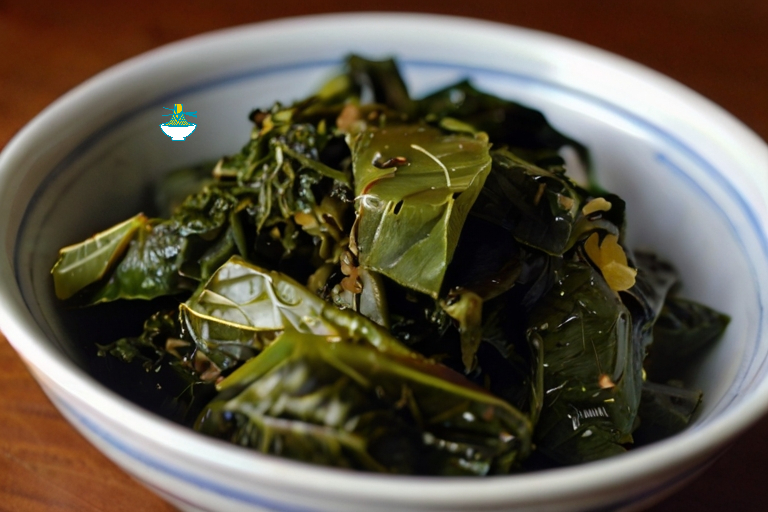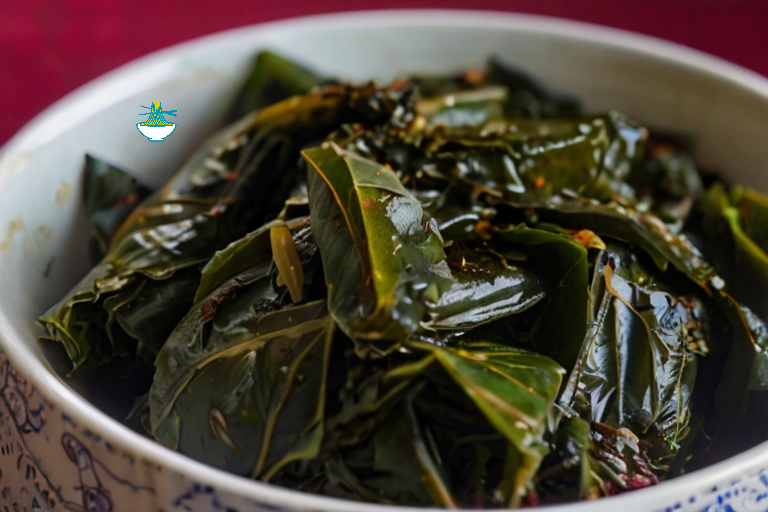Embark on a culinary adventure with our authentic Eritrean Gomen recipe. Gomen, a traditional Eritrean dish, captures the essence of East African cuisine with its vibrant flavors and aromatic spices. Made with tender collard greens, fragrant garlic, onions, and a hint of spice, this dish is a celebration of Eritrea's rich culinary heritage. Whether enjoyed as a hearty side or a satisfying main course, Eritrean Gomen promises to tantalize your taste buds and transport you to the sun-drenched shores of the Red Sea. Experience the warmth and hospitality of Eritrea with every delicious bite of this soul-satisfying dish.
Here's a traditional recipe for Eritrean Gomen:
Ingredients:
- 1 bunch of collard greens
- 2 tablespoons olive oil
- 3 cloves garlic, minced
- 1 onion, finely chopped
- 1-2 hot peppers (optional), finely chopped
- Salt to taste

Instructions:
1- Wash the collard greens thoroughly under cold water. Remove the tough stems and chop the leaves into bite-sized pieces.
2- Heat the olive oil in a large skillet or pot over medium heat.
3- Add the minced garlic, chopped onion, and hot peppers (if using) to the skillet. Sauté until the onions are translucent and fragrant, about 3-4 minutes.
4- Add the chopped collard greens to the skillet. Stir well to coat the greens with the garlic and onion mixture.
5- Cover the skillet and let the collard greens cook down for about 10-15 minutes, stirring occasionally. The greens should wilt and become tender.
6- Once the collard greens are cooked to your desired tenderness, season with salt to taste. Adjust seasoning if necessary.
7- Remove from heat and serve hot as a side dish with your favorite Eritrean or East African main course.
Enjoy your flavorful Eritrean Gomen!
Nutritional Values:
Here are approximate nutritional values for the main ingredients used in the Eritrean Gomen recipe:
Collard greens (1 bunch, approximately 350g):
- Calories: 49
- Protein: 4g
- Carbohydrates: 9g
- Fiber: 7g
- Fat: 0.5g
- Vitamin A: 308% DV
- Vitamin C: 152% DV
- Calcium: 21% DV
- Iron: 11% DV
benefits:
- High in vitamin A, which is essential for eye health and immune function.
- Rich in vitamin C, an antioxidant that boosts immune function and promotes skin health.
- Good source of calcium, important for bone health.
- Contains fiber, which aids digestion and promotes satiety.
Olive oil (2 tablespoons, approximately 28g):
- Calories: 239
- Fat: 27g
- Saturated Fat: 3.7g
- Monounsaturated Fat: 18.8g
- Polyunsaturated Fat: 3.5g
- Vitamin E: 12% DV
benefits:
- Rich in monounsaturated fats, which may help lower bad cholesterol levels and reduce the risk of heart disease.
- Contains vitamin E, an antioxidant that protects cells from damage.
- May have anti-inflammatory properties and contribute to overall heart health.
Garlic (3 cloves, approximately 9g):
- Calories: 13
- Carbohydrates: 3g
- Fiber: 0.2g
- Protein: 0.6g
- Vitamin C: 6% DV
benefits:
- Contains compounds with potent medicinal properties, including allicin, which has antibacterial and antiviral properties.
- May help lower blood pressure and improve cholesterol levels.
- Has antioxidant properties that protect against cell damage and aging.
Onion (1 medium onion, approximately 110g):
- Calories: 44
- Carbohydrates: 10g
- Fiber: 2g
- Protein: 1g
- Vitamin C: 10% DV
- Vitamin B6: 5% DV
benefits:
- Rich in vitamin C, which boosts immune function and promotes skin health.
- Contains quercetin, an antioxidant with anti-inflammatory properties.
- May help lower blood sugar levels and reduce the risk of certain cancers.
Hot peppers (1-2 peppers, approximately 14g):
- Calories: 4
- Carbohydrates: 1g
- Fiber: 0.4g
- Vitamin C: 100% DV
benefits:
- Excellent source of vitamin C, which boosts immune function and promotes skin health.
- Contains capsaicin, a compound that may help reduce inflammation and improve metabolism.
- May have pain-relieving properties and promote cardiovascular health.
These values are approximate and can vary based on factors such as the specific variety of the ingredients and cooking methods used.


Comments